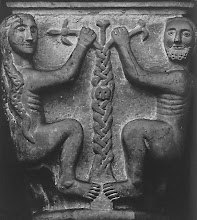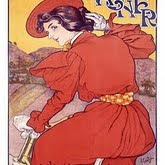And when I leave him at the first-grade door
He cries a little but is brave; he does
Let go. My selfish tears remind me how
I cried before that door a life ago.
I may have had a hard time letting go.
Each fall the children must endure together
What every child also endures alone:
Learning the alphabet, the integers,
Three dozen bits and pieces of a stuff
So arbitrary, so peremptory,
That worlds invisible and visible
Bow down before it, as in Joseph’s dream
The sheaves bowed down and then the stars bowed down
Before the dreaming of a little boy.
That dream got him such hatred of his brothers
As cost the greater part of life to mend
And yet great kindness came of it in the end.
Ann from Asia asked a few months back about this third stanza:
- Hi, my name is Ann from Asia. Recently I was studying on poetry and lukily found your work of analyzing "September, the first day of school" (You wrote it in 2007)
And I am confused about that biblical reference of Joseph in that poem, what does the whole stanza three mean for?
(Though obviously you've stopped writing since 2012:P)I will be really thankful if you reply:)
Dear Ann from Asia,
Stanza 3 is based on the story in Genesis 37 of Joseph the son of Israel:
3 Now Israel loved aJoseph more than all his children, because he was the son of his old age: and he made him a bcoat of many ccolours.4 And when his brethren saw that their father loved him more than all his brethren, they hated him, and could not speak peaceably unto him.7 For, behold, we were binding sheaves in the field, and, lo, my sheaf arose, and also stood upright; and, behold, your sheaves stood round about, and made aobeisance to my sheaf.8 And his brethren said to him, Shalt thou indeed reign over us? or shalt thou indeed have dominion over us? And they hated him yet the more for his dreams, and for his words.9 ¶And he dreamed yet another dream, and told it his brethren, and said, Behold, I have dreamed a dream more; and, behold, the sun and the moon and the eleven stars made obeisance to me.10 And he told it to his father, and to his brethren: and his father rebuked him, and said unto him, What is this dream that thou hast dreamed? Shall I and thy mother and thy brethren indeed come to abow down ourselves to thee to the earth?
Because of the envy and resentment Joseph's brothers had for him, they eventually sold him into slavery into Egypt where he suffered various trials but gradually worked his way from prison to being one of the pharaoh's top advisers, suggesting and organizing the storage of grains that saved all the Egyptian people and then Joseph's repentant brothers themselves from starvation during a later famine.
So a quick response to your question, to get you moving toward an answer: the father sees his son on the brink of mastering the data and knowledge that is power in our culture today. Not necessarily the full wisdom of deep knowing, but the data that moves the machinery of the world, the science and numbers that everything bows down to these days. This unfairness of what we study and who has access to this study reminds the father of the unfairness of Joseph's vision which though it caused resentment was also eventually the source of salvation for Joseph's resentful brothers. So the father hopes his son's education, though necessarily focused on the data and knowledge of today's technical and scientific bias will lead eventually to solving the problems, healing the pain, and mending the rifts that are also a part of our society's tehno-scientific culture.
Do you agree?







